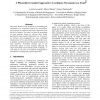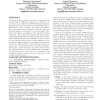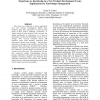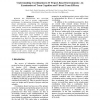ICDCSW
2002
IEEE
14 years 5 months ago
2002
IEEE
This paper focuses on the problems of coordinating the movements of a cooperative team in an environment, and proposes an approach that takes inspiration from the laws of physics....
ATAL
2003
Springer
14 years 5 months ago
2003
Springer
Effective coordination of robots, agents and people promises to improve the safety, robustness and quality with which shared goals are achieved by harnessing the highly heterogene...
UM
2005
Springer
14 years 6 months ago
2005
Springer
In a collaborative environment, knowledge about collaborators’ skills is an important factor when determining which team members should perform a task. However, this knowledge ma...
ATAL
2005
Springer
14 years 6 months ago
2005
Springer
Collaboration plays a critical role when a team is striving for goals that are difficult to achieve by an individual. In previous work, we defined the ETAPP (Environment-TaskAgen...
IWIC
2007
Springer
14 years 6 months ago
2007
Springer
We followed the work of an international research network that holds regular meetings in technology-enhanced environments. The team is geographically distributed and to support its...
ROBOCOMM
2007
IEEE
14 years 6 months ago
2007
IEEE
Abstract—Robust, dependable and concise coordination between members of a robot team is a critical ingredient of any such collective activity. Depending on the availability and t...
HICSS
2008
IEEE
14 years 7 months ago
2008
IEEE
Individuals face additional challenges when interacting in virtual teams. The lack of media richness and the asynchronous nature of technologically transmitted messages make commu...
HICSS
2009
IEEE
14 years 7 months ago
2009
IEEE
This study was conducted to better understand how New Product Development (NPD) team members apply their experiences to meet the task needs of their project. Although “experienc...
HICSS
2009
IEEE
14 years 7 months ago
2009
IEEE
Research has demonstrated how successful coordination can lead to greater organizational performance. In information technology (IT) projectbased environments, coordinating the kn...




